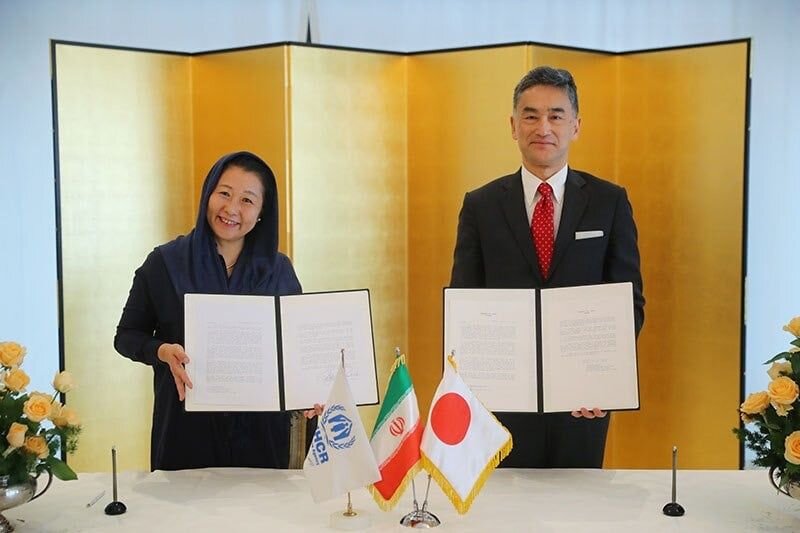Japan, UNHCR to improve education, healthcare for refugees in Iran

TEHRAN – In a bid to provide Afghan refugees and host communities in Iran with quality education and healthcare services, the Government of Japan and the United Nations High Commissioner for Refugees have signed a partnership agreement.
This contribution, worth $3.3 million, builds on a long-term collaboration between the Government of Japan and UNHCR Iran, mainly in the areas of health, education, and livelihood, the UNHCR website announced in a press release on February 27.
This has helped in delivering essential services, promoting inclusion, and empowering displaced Afghans struggling to rebuild their lives in exile.
“We are profoundly grateful to the people of Japan for their long-standing generosity,” said Ms. Yumiko Takashima, UNHCR Representative in Iran. “This critical funding is a testament to their global leadership on refugee issues and matches 2023 Global Refugee Forum’s spirit, where Japan’s government and civil society just renewed their pledges.”
The three-year project includes the construction of new schools which will serve refugee and host community children alike.
This will enhance quality primary and secondary education, helping to nurture youth’s talents and ambitions for the future, in line with the Iranian government’s inclusive education policy allowing foreign nationals to enroll in public schools.
The Government of Japan's contribution will also cover the health insurance costs for 21,700 vulnerable Afghan refugees, enabling them to access secondary and tertiary medical care.
“Refugees are an important global concern. Japan, as a responsible international actor, plays its role in alleviating the host community’s burden,” said H.E. TSUKADA Tamaki, Ambassador of Japan to Iran.
“We believe the best outcome can be achieved through collaboration with international partners like UNHCR. With this grant we want to meet our responsibility sharing to support refugees and their host communities across Iran,” he added.
For over 40 years, UNHCR has assisted the Government of Iran in hosting one of the world’s largest and most protracted refugee situations. Iran continues to set a progressive example through its inclusive national policies, especially on health, education, and social services accessible also by refugees.
UNHCR funds free health coverage for refugees
About 200,000 foreign nationals in the country have been provided with free health insurance with the financial support of the UNHCR, the managing director of Iran Health Insurance Organization said on February 25.
Foreign nationals who are considered financially struggling can benefit from free health insurance services, Mehr news agency quoted Mohammad-Mehdi Nasehi as saying.
Stating that the number of refugees in the country is far more than the number of people who have been covered by free insurance, Nasehi added that legal refugees can enjoy insurance services by paying their insurance premiums.
In November 2023, Jamshid Shayanfar, an official with the Health Insurance Organization of Iran said some 95,000 foreign nationals who hold legal residence permits and are suffering from hard-to-cure diseases receive free health insurance annually.
Their insurance contract will be renewed every year in the month of Esfand – the last Iranian calendar month ending on March 19, Fars quoted Shayanfar as saying.
He added, “The insurance premiums for these people are covered by the High Commissioner for Refugees, and the insurance premiums for about 60,000 citizens are paid to the health insurance organization based on the government budget.”
Shayanfar went on to say that around 800,000 non-vulnerable nationals also have to pay their insurance premiums; once they pay the insurance premium, they will enjoy health insurance services for a year.
Some 12,000 non-vulnerable nationals have already been covered by health insurance, he concluded.
UNICEF, UNHCR support Iran’s refugee policies
On February 12, UNHCR and the United Nations Children's Fund (UNICEF) signed a letter of understanding (LOU) to support the Iranian government’s response to the growing needs of refugees.
The cooperation focuses on joint advocacy in a variety of areas such as child protection, education, health, and nutrition, as well as water, sanitation, and hygiene (WASH) sectors.
MT/MG
